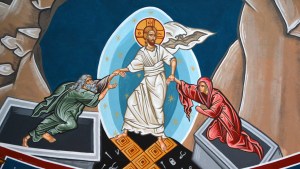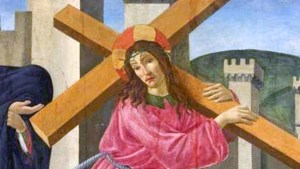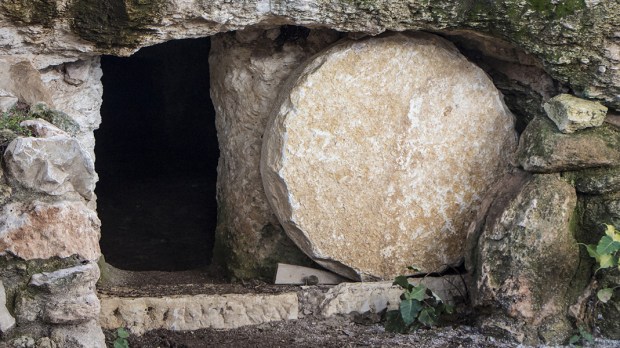Most popular depictions of Jesus’ burial and resurrection show a large circular stone that was rolled in front of Jesus’ tomb. Did that really happen?
According to archaeological research, tombs in 1st-century Jerusalem were closed either by a large circular stone, like most artistic representations, or a large square “plug.”
Scholar Megan Sauter explains that “of the more than 900 Second Temple-period burial caves around Jerusalem examined by archaeologist Amos Kloner, only four have been discovered with disk-shaped blocking stones.”
Most archaeologists believe that Jesus’ tomb was of the “square” variety, on account of the rarity of such circular stones. Yet, the Gospel accounts describe the stone being “rolled” in front of the tomb. How can a square stone be “rolled”?
Urban C. von Wahlde “explains that the Synoptic Gospels (Matthew, Mark and Luke) all use a form of the Greek verb kulio to describe how the stone sealing Jesus’ tomb was moved. Kulio means ‘to roll.'” Initially this appears to refute the claim, but “It may very well be that people rolled the “cork-shaped” stones away from the tomb. Once you see the size of a “stopper” stone, it is easy to see that, however one gets the stone out of the doorway, chances are you are going to roll it the rest of the way.’ Although they certainly would not have rolled as easily as round (disk-shaped) stones, cork-shaped stones still could have been rolled.”
Furthermore, the Gospel of John does not use the same Greek word and describes the stone as being “removed.” This appears to confirm the theory that the stone was a square “plug,” rather than a large circular disk.
Nevertheless, regardless of which type of stone sealed Jesus’ tomb, the reality was that the stone was difficult to move and explains why Mary Magdalene was worried about how they could possibly move it to get inside the tomb. To her surprise, when she approached the tomb the stone was no longer obstructing the way and was moved away by the angels, revealing an empty tomb.
And behold, there was a great earthquake; for an angel of the Lord descended from heaven, approached, rolled back the stone, and sat upon it. His appearance was like lightning and his clothing was white as snow. The guards were shaken with fear of him and became like dead men. Then the angel said to the women in reply, “Do not be afraid! I know that you are seeking Jesus the crucified. He is not here, for he has been raised just as he said.” (Matthew 28:2-6)

Read more:
Where did Jesus go on Holy Saturday?

Read more:
What kind of cross did Jesus carry to Calvary?

